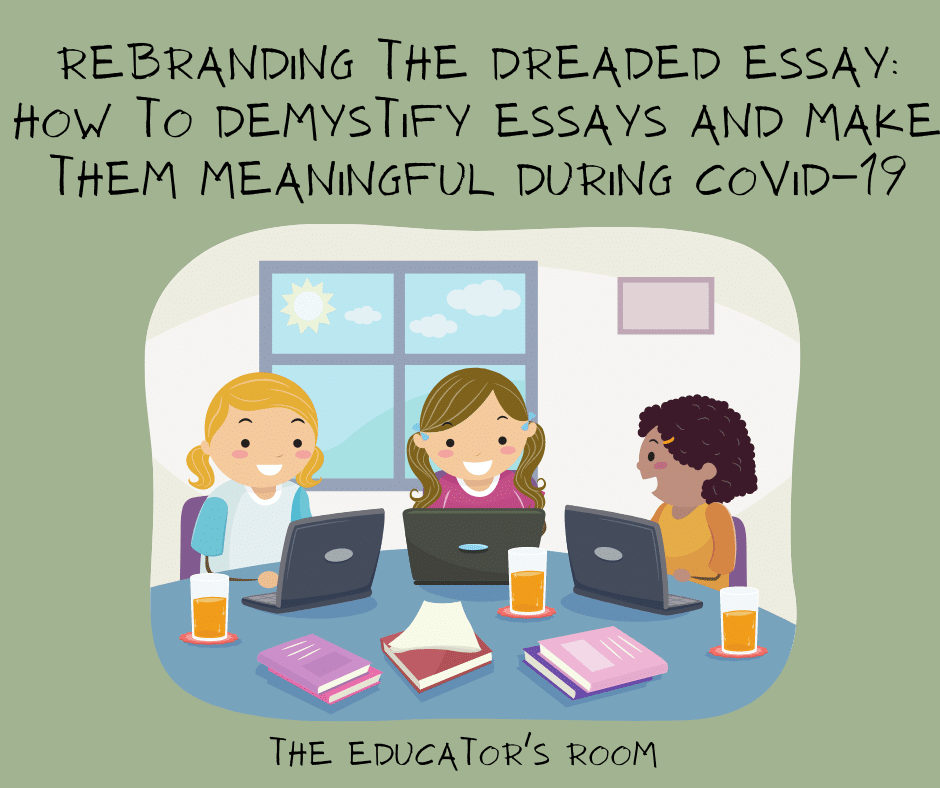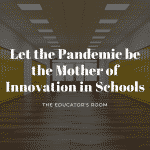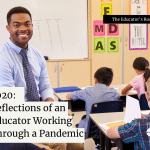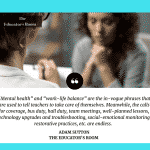Whenever students hear the word “essay,” they groan, eye roll, and plead for something, anything else.
Similarly, most adults I know remember high school or college essays they grudgingly finished just under the wire; late-night coffee, obsessive word counting, and a fair amount of teacher-specific bs-ing.
It’s clear “The Essay” gets a bad rap, and it desperately needs a rebrand.
At their best, essays should be personally meaningful, demonstrate textual understanding, and grow students’ writing skills. At their worst, they lack purpose, have hollow literary-speak, and students’ don’t even really know what they’re trying to say.
Just like I want students to choose high-interest books they’ll actually read, I want to teach essays they actually want to write. Here’s how I approach it:
Start with a purposeful essential question (Essays should be personally meaningful)
Textual analysis should provide insights as to the vehicle for a broader conversation. Yes, we want to look at characterization, figurative language, and plot, but not just for the sake of identifying “static character,” “metaphor” and “climax.” So, when crafting a unit essential question, I strive to make it personally meaningful, not just literary.
For example, in our opening unit this year, the essential question was: How is identity created? This is broad enough that it can be interpreted in myriad ways but focused enough that it offers a guiding lens with which to view the text.
With this question, while reading The House on Mango Street, a student identified that the trees understanding Esperanza is personification.
Great, accurate.
But, she then went on to explain how that literary device reveals a layer of Esperanza’s identity. She wrote, “This shows that she doesn’t have people in her life she can turn to. Esperanza uses the trees outside her window to belong. She starts to see herself like them. That shapes her identity because she is strong too and she fights for what she wants.”
Excellent and insightful, tied directly to the essential question.
Stick with it (Essays should demonstrate textual understanding)
Focusing on one essential question for a unit isn’t as repetitive as it may seem at first glance. Each piece of evidence that students gather offers new opportunities to interpret the prompt differently, whether between several texts or over the course of a novel.
With this identity unit, students never picked the same aspect of identity (gender, neighborhood, relationships) for all their evidence. In fact, most built on their thinking as they read and wrote. Perhaps first identifying Esperanza’s desire for a house, and then later delving into something more complex like expected gender roles later on.
Write one paragraph at a time (Essays should grow students’ writing)
Maybe the worst part of the capital “E” Essay is the anxiety-ridden feeling that they need to write it all at once. What may seem straightforward to a teacher can still be incredibly overwhelming to many (maybe even most) students.
To combat this apprehension, we instead tackle that essential question as we go, both in reading and writing.
Students choose examples from the text that they find meaningful and write one guided paragraph at a time. I include sentence stems and color-coding as differentiation tools; those who need the support use them, and those who are ready to expand can run free.
All English teachers have faced the frustrating reality that most of the time, students look for the grade points, not thoughtful feedback. This process is both disheartening to teachers and futile for the students. So, instead, I give them feedback as they write these “practice” paragraphs. This way, they can actually reflect on and implement those tips before, rather than after, an essay is actually due.
Write smarter, not harder (Essays should grow students’ writing)
By the time we get to the dreaded essay, I reveal “the trick.” They can copy and paste the three paragraphs they already wrote as their body paragraphs.
The way I see it, they’ve already done the thinking and writing, so there’s no reason to reinvent the wheel. Sure, on-demand writing might have its time and place, but true writers are born out of small successes and revising what they’ve already written.
From there, we hit the thesis, another word that is unnecessarily intimidating. In reality, it’s just a one-sentence outline and once they have three paragraphs, they already have three main points ( or prongs) of a thesis. I highlight those points to show them what they’ve already accomplished and it’s so satisfying to demystify the process right in front of them. Oh, that’s it?
By the time we “start” an essay, students have 75% of it done. I then teach intros, conclusions, and edits like transitions for flow.
Reflect (Essays should be personally meaningful)
Of course, teaching an essay online this year poses its own unique set of challenges. In-person, I’d normally be kneeling right beside them, prompting, reading drafts, and honestly, offering emotional support. For this first unit, I knew I needed to offer as much clarity and step by step breakdowns as possible.
It seemed to work, but I never know until I go directly to my best source: my students. Teenagers are nothing if not brutally honest. They can bring a “great” lesson to its knees as efficiently as a dropped zoom connection
I asked them to reflect on what went well for them (celebration) and what they want to improve on (growth). But then, I asked what I did that helped and what I could do to improve my teaching and support in the future. After all, the best-planned assignment is meaningless if it isn’t working for students.
Here’s some of the feedback I received:
- Students reflected on teaching and lesson design: I really like how the body paragraphs were done before we did the essay and I really like the instructions given for every step of the essay.
- They even went meta and thought about the writing process itself: I like how we got to work on each body paragraph bit by bit to give us a better understanding and refresh our brains on how an essay should look piece by piece.
- They commented on their lowered stress: This was probably my best experience with writing an essay and feeling comfortable with it. It was like the least stressful essay I have ever done.
These students weren’t anomalies. Every single student said this process worked, which was both shocking and gratifying.
The cherry on top? Multiple students said they were even ready to do it again- no small miracle in 10th-grade essay land: I liked the structure of the power paragraphs and feel like I could do that again in this unit 🙂 and Writing ahead of time was amazing and I think we should do it again.
There’s really nothing more I, and this rebranded essay could hope for.







I found this one late, for sure, but some great thoughts here on managing the essay with students. The beauty is that citation is so simple now (using options such as the built in citation tool on Google Docs), students can now focus on the what and why of their topic rather than on the mechanical minutiae of the citation process.